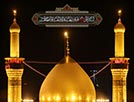Types of Ghiība
- Details
- Hits: 2504
Types of Ghiība
According to clear traditions and opinion of religious scholars it makes no difference whether the defect mentioned is of a physical nature, pertains to ones descent, a trait of ones character or with regard to ones speech or actions, or whether it is with regard to religion or worldly aspects. Special mention is made of defects pertaining to ones dress, house, vehicle etc. Examples are cited for each of these. A physical defect is mentioned that, such and such is cockeyed, one-eyed, bald, short, tall, dark complexioned, yellow skinned etc.
If these characteristics are mentioned in a manner that he will be unhappy if he heard about it, it is GhiÄ«ba. GhiÄ«ba of ones family origin is saying, ‘His father was a sinner, evil, miser, libertine, weaver, low caste etc. GhiÄ«ba of character is saying such and such is bad-character, miser, arrogant, coward, weak, hypocrite, thief or an oppressor. GhiÄ«ba with regard to religious matters is saying that a person is a liar, a drunkard, he neglects prayers, he is bad mannered, ungrateful, he doesn’t realize his low position, he’s talkative, a glutton, an excessive sleeper. GhiÄ«ba in relation to dress is saying his dress is dirty, torn, old, long or short. If these are mentioned in a manner that a person wouldn’t like to hear about himself, it is GhiÄ«ba.
It should be clear that it makes no difference whether the defect is mentioned verbally or expressed in action or gestures. Even if one makes an allusion and it is understood in the sense he intends, it is GhiÄ«ba. Sometimes allusion is worse than GhiÄ«ba. For example, saying, ‘Alhamdolillah (Praise to be Allah), Allah has not made us covet rulership, or made us supporters of oppressors or did not make us greedy of wealth. Or if one says, we seek refuge of Allah from jealousy, niggardliness or shamelessness, May Allah protect us from the mischief of Shaitan; and by saying all this he desires to indicate the person who has these traits.
Often times when someone intends to do GhiÄ«ba of a person, he initially heaps praises upon him. For example saying: He is so nice! It’s a pity he’s caught in Satan’s trap and became such and such. Another example is to be aggrieved in a hypocritical way: I am really aggrieved and my heart has burnt in the sorrow for such and such person. This is not true because if he were really sincere and a true friend he would not have criticized him and exposed his defects.











